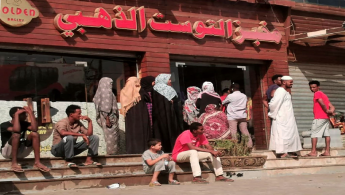Bread, fuel queues in Sudan as military coup brings country to a halt
Long queues for petrol and bread have reappeared in Sudan as a crisis in governance grips the country.
Fuel shortages and road closures have forced bakeries and businesses to shut down, days after a military takeover.
Merchants have told The New Arab’s sister site Al-Araby Al-Jadeed, that they are running out of stocks of staples including especially flour, oils, and sugar. Flour is already scarce in many markets, Al-Araby Al-Jadeed reported.
Citizen Sami Ibrahim said the internet blackout and closure of banks has exacerbated the chaos, forcing people to borrow money from others as they cannot withdraw from their own deposits.
"If this situation persists, it may result in social disorder and create new problems that will be difficult to address in the short term," he told Al-Araby Al-Jadeed.
Many factory owners have been forced to suspend operations as warehouses sit empty due to a lack of basics.
This is also partly due to road closures in Khartoum and elsewhere around the country as people continue to demonstrate and set up barricades to protest the 25 October military coup. A number of protesters have been shot dead.
Soldiers detained Prime Minister Abdalla Hamdok, his ministers and civilian leaders who had been heading Sudan's democratic transition following the 2019 overthrow of autocrat Omar al-Bashir.
Sudan's top general Abdel Fattah al-Burhan dissolved the cabinet the next day, as well as the ruling Sovereign Council of military and civilian figures.
The country's energy ministry plans to reopen an oil pipeline, according to the Sudan News Agency - a move that could help ease the fuel crisis.
Roads leading to and from Port Sudan – the country’s main seaport, from where oil is transported to the capital Khartoum - were cut off for weeks by tribal groups, which made it impossible for oil tankers to make any journeys.





 Follow the Middle East's top stories in English at The New Arab on Google News
Follow the Middle East's top stories in English at The New Arab on Google News
![The UAE is widely suspected of arming the RSF militia [Getty]](/sites/default/files/styles/image_330x185/public/2024-11/GettyImages-472529908.jpg?h=69f2b9d0&itok=Yauw3YTG)
![Netanyahu furiously denounced the ICC [Getty]](/sites/default/files/styles/image_330x185/public/2024-11/GettyImages-2169352575.jpg?h=199d8c1f&itok=-vRiruf5)
![Both Hamas and the Palestinian Authority welcomed the ICC arrest warrants [Getty]](/sites/default/files/styles/image_330x185/public/2024-11/GettyImages-2178351173.jpg?h=199d8c1f&itok=TV858iVg)